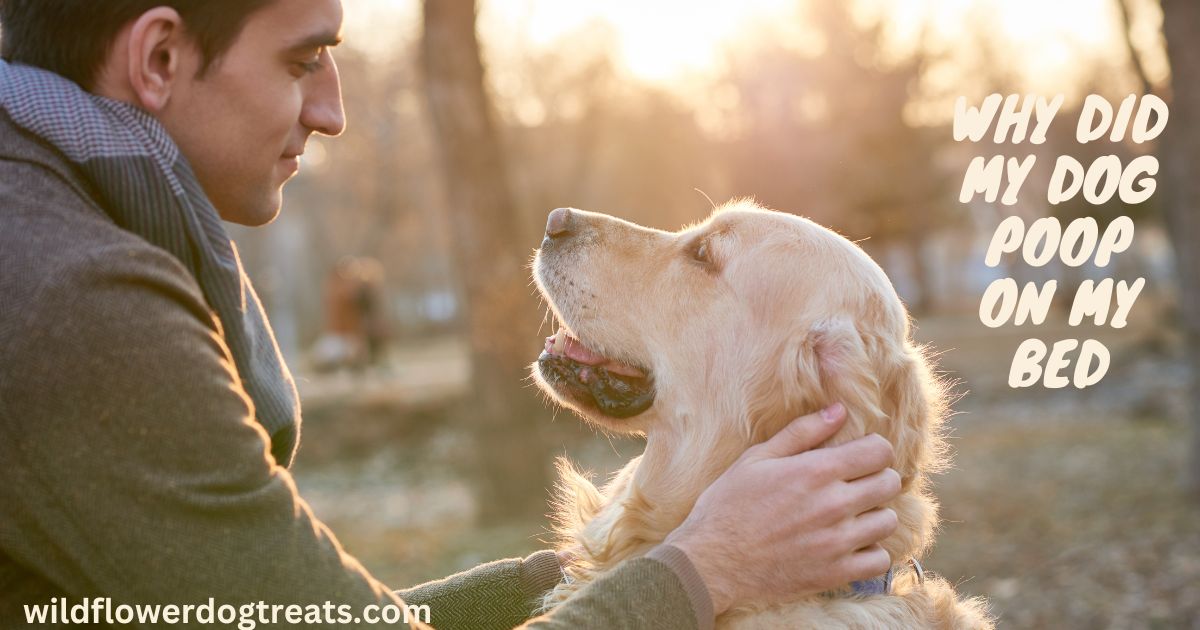Your dog may have pooped on your bed due to a possible medical issue or behavioral problem. It is important to consult a veterinarian to rule out any health problems and consider potential triggers or changes in routine that may have caused this behavior.
Additionally, providing your dog with proper toilet training and maintaining a consistent routine can help prevent accidents in the future. Boosting mental and physical stimulation can also help address any underlying anxiety or boredom that may lead to inappropriate elimination.
Why Dogs Choose To Poop On Beds Instead Of Designated Areas
Dogs may choose to poop on beds instead of designated areas due to various reasons. It could be a sign of anxiety, illness, or territorial marking behavior. Understanding the underlying cause and providing proper training can help prevent this behavior in the future.
Importance Of Understanding Canine Behavior
As dog owners, it can be frustrating and confusing when our beloved pets choose to relieve themselves on our beds instead of their designated areas. Understanding the reasons behind this behavior is important in order to address the issue effectively and prevent it from happening again.
Instinctual Reasons For Dogs Choosing Beds
Dogs have certain instinctual behaviors that can make them prefer to poop on beds. These instincts can be traced back to their ancestors, the wolves. Wolves instinctively want to mark their territory and establish their presence, and this behavior can carry over to our domesticated dogs. By pooping on your bed, your dog is essentially claiming it as their own and leaving their scent behind as a way of marking territory.
In addition to claiming territory, dogs may also choose to poop on beds because the texture and scent of the bedding may remind them of the outdoors. Some dogs have a strong connection to nature and may find comfort in familiar scents and textures, leading them to naturally gravitate towards beds as a suitable place to relieve themselves.
Behavioral Issues Causing This Behavior
While some dogs may choose to poop on beds due to instinctual reasons, others may have underlying behavioral issues that contribute to this behavior. These issues can include anxiety, stress, or even a lack of proper house training.
Anxiety and stress can disrupt a dog’s normal elimination routine, leading them to seek out alternative places to relieve themselves. If your dog is experiencing anxiety or stress, it’s important to identify and address the root cause through professional guidance or behavioral training.
Lack of proper house training or inconsistent reinforcement of house rules can also play a role in dogs choosing to poop on beds. If a dog hasn’t been properly trained to understand where they should be relieving themselves, they may resort to using the most comfortable or familiar spot they can find. Consistency, positive reinforcement, and establishing a clear routine for bathroom breaks can help address this issue.
Overall, understanding the reasons behind why dogs choose to poop on beds instead of designated areas is crucial in order to effectively address and prevent this behavior. By recognizing the instinctual and behavioral factors involved, dog owners can take appropriate steps to provide the necessary training, support, and environment to ensure their dog’s needs are met in a suitable manner.
Recognizing Signs Of Stress Or Anxiety In Dogs
As dog owners, we love our furry companions unconditionally. So, when our beloved canine friends suddenly decide to leave a surprise on our beds, it can be quite perplexing. However, before becoming frustrated, it’s essential to understand that this behavior might be a sign of stress or anxiety in dogs. By familiarizing ourselves with the key indicators, we can better comprehend our furry friend’s needs and work towards resolving their distress.
Understanding Dog Body Language
Dogs express themselves through a variety of non-verbal cues, making it vital for pet owners to be attuned to their body language. To recognize signs of stress or anxiety, observe your dog’s posture, facial expressions, and tail movement. Some common indicators to look out for include:
| Posture | Facial Expressions | Tail Movement |
|---|---|---|
| Low body position | Furrowed brow | Between the legs or tucked under the body |
| Avoiding eye contact | Pulled back ears | Slow wagging or tucked tail |
| Trembling or shaking | Yawning excessively | Stiff or wagging rapidly |
By closely observing your dog’s body language, you can gain valuable insights into their emotional state and identify any underlying anxiety or stress they may be experiencing.
Behavioral Cues Indicating Stress Or Anxiety
In addition to body language, dogs exhibit various behavioral cues when they are feeling stressed or anxious. These behaviors can manifest in different ways, and it’s important to pay attention to any sudden changes in your dog’s routine. Some behavioral signs to watch for include:
- Excessive barking or whining
- Pacing or restlessness
- Excessive panting or drooling
- Loss of appetite
- Increased aggression or withdrawal
- Compulsive behaviors, such as chewing or licking
Keep in mind that each dog may display unique signs of stress or anxiety, and it’s essential to be familiar with your particular pet’s behavioral patterns.
How These Signs Relate To Bed Pooping Behavior
Now that we understand the signs of stress or anxiety in dogs, we can explore their relationship to the bed pooping behavior. When dogs feel stressed or anxious, they may exhibit destructive behaviors as a form of coping or communicating their distress. In some cases, pooping on the bed can act as a way for dogs to mark their territory or seek comfort in familiar scents.
By recognizing the signs of stress or anxiety in our canine companions, we can address their emotional needs and find ways to alleviate their distress. This understanding allows us to create a supportive environment that promotes their overall well-being and helps prevent bed pooping incidents in the future.
Addressing Behavioral Issues To Prevent Bed Pooping
Dealing with a dog that poops on your bed can be frustrating and puzzling. However, understanding the reasons behind this behavior and addressing the underlying issues is crucial in preventing future incidents. In this article, we will explore some effective strategies to tackle bed pooping and promote proper bathroom habits in dogs.
Positive Reinforcement Training Techniques
One of the most essential steps in curbing bed pooping is implementing positive reinforcement training techniques. Dogs thrive on rewards and praise, and using these methods can help redirect their behavior in a positive way. When your dog eliminates in the appropriate place, such as outdoors or in their designated bathroom spot, it is important to immediately reward them to reinforce the desired behavior.
- Reward your dog with treats or verbal praise every time they successfully eliminate outside or in their designated bathroom area.
- Utilize clicker training to mark the moment they eliminate in the correct spot, followed by a reward.
- Establish a consistent command or cue for bathroom time, such as “go potty” or “do your business.” Make sure to use this cue consistently and praise your dog when they respond appropriately.
Providing Appropriate Outlets For Energy And Mental Stimulation
Many times, dogs may engage in inappropriate elimination behaviors due to excess energy or mental boredom. By ensuring your dog receives adequate exercise and mental stimulation, you can reduce the likelihood of them seeking out alternative bathroom spots, such as your bed.
Here are some strategies to provide appropriate outlets for your dog’s energy:
- Schedule regular exercise sessions to tire out your dog physically. Engage in activities such as daily walks, play sessions, or interactive games like fetch.
- Provide mental stimulation through puzzle toys, treat-dispensing toys, or training sessions. This helps keep your dog’s mind engaged and prevents them from becoming bored, which can lead to destructive behavior.
- Consider enrolling your dog in obedience classes or engaging in regular training sessions. This not only helps them learn proper bathroom behavior but also provides mental stimulation and strengthens your bond.
Consistency In Establishing Bathroom Routines
An important aspect in preventing bed pooping is establishing consistent bathroom routines for your dog. By setting a schedule and adhering to it, you can teach your dog where and when they should eliminate, decreasing the likelihood of accidents occurring on your bed.
Here are some guidelines to follow in establishing bathroom routines:
- Take your dog to their designated bathroom spot at regular intervals, especially after meals, naps, and play sessions.
- Stay outside with your dog until they have eliminated, and reward them immediately afterwards.
- Use the same route and method of transport to reach the designated bathroom spot each time, as this can help reinforce the association.
- Be patient and consistent, as it may take time for your dog to develop proper bathroom habits.
Creating A Safe And Comfortable Sleeping Environment For Dogs
Dogs are more than just pets; they are beloved members of the family. Creating a safe and comfortable sleeping environment for dogs is essential for their well-being and happiness. From selecting a suitable bed tailored to your dog’s needs to considering the location of the bed within your home, there are several factors to take into account. Additionally, utilizing calming aids and methods to reduce anxiety can further contribute to a peaceful night’s sleep for your furry friend.
Selecting A Suitable Bed For Your Dog’s Needs
When choosing a bed for your dog, consider their size, age, and sleeping habits. Larger breeds may require more spacious beds, while older dogs may benefit from orthopedic or memory foam mattresses to support their joints. Look for materials that are durable, washable, and comfortable for your dog’s specific preferences.
Considering The Location Of The Bed Within The Home
The placement of your dog’s bed can greatly impact their comfort and sense of security. Ensure the bed is located in a quiet area free from high foot traffic and loud noises. Take into account your dog’s preference for warmth or coolness and place the bed accordingly, away from drafts or direct sunlight.
Utilizing Calming Aids And Methods To Reduce Anxiety
For dogs who exhibit anxiety or stress, providing calming aids such as aromatherapy with lavender or chamomile scents, and using comforting tools like weighted blankets or soft toys can help create a soothing environment. Establish a bedtime routine to signal relaxation and tranquility, such as a gentle massage or quiet playtime.
Seeking Professional Help For Persistent Bed Pooping Behavior
Discovering that your dog has pooped on your bed can be frustrating and confusing. When a dog displays persistent bed pooping behavior, seeking professional help becomes necessary. Whether it’s due to a medical issue or a behavioral problem, consulting a veterinarian or an animal behaviorist can provide vital insights and guidance to address this issue effectively.
When To Consult A Veterinarian Or Animal Behaviorist
If you notice a pattern of bed pooping behavior in your dog, consulting a veterinarian or an animal behaviorist is crucial. They can help determine whether the behavior is due to a medical condition or behavioral issue, and offer appropriate guidance for intervention.
Diagnostic Tests To Rule Out Underlying Medical Conditions
If the bed pooping behavior persists, it’s important to consider conducting diagnostic tests to rule out any underlying medical conditions. These can include blood tests, fecal exams, and examinations for digestive disorders or urinary issues. Proper diagnosis is critical in determining the cause of the behavior.
Developing A Tailored Behavior Modification Plan
Creating a tailored behavior modification plan is essential in addressing bed pooping behavior in dogs. This includes implementing positive reinforcement, establishing a consistent routine, and possibly using desensitization or counter-conditioning techniques. Working closely with a professional can help devise a plan that fits your dog’s specific needs.
Frequently Asked Questions For Why Did My Dog Poop On My Bed
Why Does My Dog Poop On My Bed?
Dogs may poop on your bed due to anxiety, illness, or lack of house training. It’s essential to rule out any health issues and ensure your dog has access to outdoor bathroom breaks and a comfortable sleeping area. Consulting a veterinarian can help address this behavior.
How Do I Stop My Dog From Pooping On My Bed?
To prevent this behavior, provide regular outdoor potty breaks, consider crate training, and ensure your dog feels secure and comfortable in their sleeping space. Positive reinforcement for proper elimination, along with professional training guidance, can also aid in correcting this issue.
What Are The Possible Health Reasons For My Dog Pooping On My Bed?
Medical conditions such as gastrointestinal distress, incontinence, or mobility issues could lead to dogs pooping on the bed. Consulting a veterinarian can help identify and address any underlying health issues causing this behavior, ensuring the well-being of your pet.
Conclusion
To sum it up, finding your dog’s poop on your bed can be a perplexing and frustrating experience. However, there are several reasons why this might have happened. It could be due to medical issues, anxiety, territorial marking, or a lack of proper training.
By understanding the possible causes and addressing them effectively, you can prevent this unpleasant surprise from happening again. Remember, patience and consistency are key when it comes to training and resolving this issue with your beloved canine companion.




